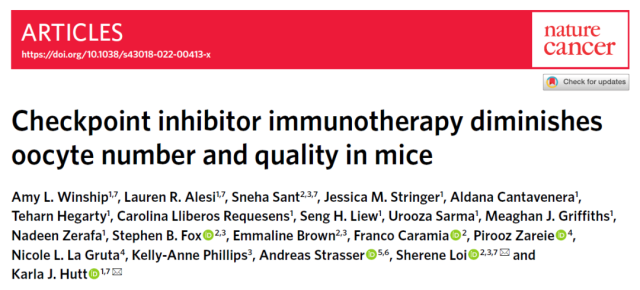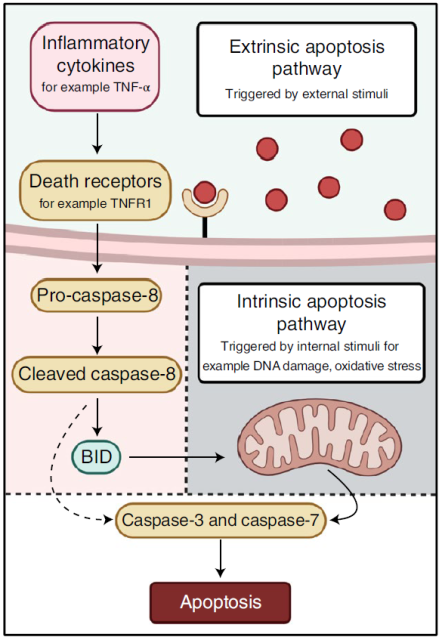Will the checkpoint inhibitor immunotherapy impair female fertility?
- Normal Liver Cells Found to Promote Cancer Metastasis to the Liver
- Nearly 80% Complete Remission: Breakthrough in ADC Anti-Tumor Treatment
- Vaccination Against Common Diseases May Prevent Dementia!
- New Alzheimer’s Disease (AD) Diagnosis and Staging Criteria
- Breakthrough in Alzheimer’s Disease: New Nasal Spray Halts Cognitive Decline by Targeting Toxic Protein
- Can the Tap Water at the Paris Olympics be Drunk Directly?
Will the checkpoint inhibitor immunotherapy impair female fertility?
- Should China be held legally responsible for the US’s $18 trillion COVID losses?
- CT Radiation Exposure Linked to Blood Cancer in Children and Adolescents
- FDA has mandated a top-level black box warning for all marketed CAR-T therapies
- Can people with high blood pressure eat peanuts?
- What is the difference between dopamine and dobutamine?
- How long can the patient live after heart stent surgery?
Will Cancer immunotherapy impair fertility?
With the development of biology and medicine, human beings have a deeper understanding of cancer and their own immune system, and human beings have made major breakthroughs in the field of cancer treatment.
Especially the immune checkpoints represented by PD-1 / PD-L1 ( The discovery of immune checkpoint and the emergence of cancer immunotherapy represented by immune checkpoint inhibitors can be said to have completely changed the pattern of cancer treatment and brought hope to cancer patients.
James Allison and Honjosuke also won the 2018 Nobel Prize in Physiology or Medicine for their discovery and advancement of immune checkpoint-based cancer treatments.
Traditional cancer treatments, such as chemotherapy and radiation , have been linked to permanent side effects on the ovaries of women with cancer, which may lead to infertility and premature menopause in women with cancer after treatment.
Immune checkpoint inhibitors are becoming more widely used as an emerging class of cancer immunotherapies, but it remains unclear whether they have the same potential reproductive side effects as chemotherapy and radiotherapy.
On August 25, 2022, researchers from Australia’s Monash University and the University of Melbourne published a research paper titled: Checkpoint inhibitor immunotherapy diminishes oocyte number and quality in mice in Nature Cancer , a sub-journal of Nature .
The study shows that commonly used cancer immunotherapy drugs, such as immune checkpoint inhibitors , cause permanent damage to the ovaries and the follicles they store in mice, reduce the number and quality of eggs, interfere with ovulation, and disrupt reproductive cycles .
Therefore, immune checkpoint therapy may affect future fertility in female cancer survivors, suggesting that more research is needed to help preserve fertility in women with cancer, or to prepare for preventive strategies (such as egg freezing before treatment ) .

In the past, radiotherapy and chemotherapy were thought to be prone to off-target effects and cause damage to the body, while immunotherapy was more precise and therefore less damaging to the body, but in fact, inflammatory side effects of these immunotherapy drugs on other organs are common.
In this latest study, the research team evaluated the effects of PD-L1 inhibitor and CTLA-4 inhibitor treatment on mouse ovaries in both tumor-free and tumor-free mouse models .
Results showed that immune checkpoint inhibition increased immune cell infiltration and tumor necrosis factor-α (TNF-α) expression within the ovary, and TNF-α induced apoptosis by binding to TNFR1, which is expressed in all follicle types , including primordial follicles, thereby reducing the ovarian follicular reserve and impairing the ability of oocytes to mature and ovulate.
As a result, commonly used cancer immunotherapy drugs, such as immune checkpoint inhibitors, can cause permanent damage to the ovaries and the follicles stored in them, reducing the number and quality of eggs, interfering with ovulation, and disrupting reproductive cycles.

The team says further studies in female cancer patients are needed to validate the findings, and for those women with cancer who need these immunotherapies, especially women of childbearing age , egg or embryo freezing may be considered for preservation Fertility.
In addition, future clinical trials should also investigate how these immunotherapies affect ovarian function and fertility in women.
Immunotherapy is becoming the standard of care for many women with curable early-stage breast cancer due to impressive results in reducing breast cancer recurrence, but this study highlights the need for further observations on its long-term effects .
Egg or embryo freezing is the only fertility preservation method currently available, but it is expensive, invasive, and does not prevent ovarian damage.
Therefore, targeted prevention of ovarian damage caused by treatment without affecting the effect of cancer treatment is the current priority research direction.
Paper link :
https://www.nature.com/articles/s43018-022-00413-x
Will the checkpoint inhibitor immunotherapy impair female fertility?
(source:internet, reference only)
Disclaimer of medicaltrend.org
Important Note: The information provided is for informational purposes only and should not be considered as medical advice.



